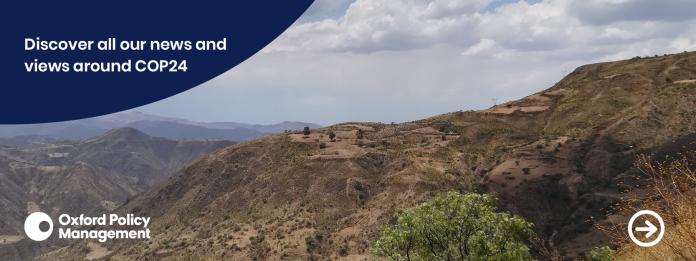Towards a resilient nation: Nepal’s key expectations from COP24
Conclusive decisions, as well as domestic actions, are needed to ensure COP24 works for the most vulnerable countries
-
Date
December 2018
-
Area of expertiseClimate, Energy, and Nature
-
KeywordsClimate policy and finance , Energy, resources and growth , COP
-
OfficeOPM Nepal
The twenty-fourth session of the Conference of the Parties (COP24), the fourteenth session of the Conference of the Parties serving as the meeting of the Parties to the Kyoto Protocol (CMP 14), and the third part of the first session of the Conference of the Parties serving as the meeting of the Parties to the Paris Agreement (CMA 1.3) were held in Katowice, Poland, 3-14 December 2018. The COP24 was mandated to finalise the implementation guidelines – Paris Agreement Work Programme (PAWP) - of the Paris Agreement, hold the political phase of the Talanoa Dialogue, and host the high-level ministerial meeting on climate finance and climate action and ambition.
[button-link text="News and views at COP24" link="http://www.opml.co.uk/cop24"]
The need for decisive action
COP24 is crucial for countries like Nepal in the context of new IPCC assessment report. The Special Report on Global Warming of 1.5ºC was recently approved by the IPCC, and highlights that limiting global warming to 1.5ºC would require rapid, far- reaching, and unprecedented changes in all aspects of society. It also emphasises that, with clear benefits to people and natural ecosystems, limiting global warming to 1.5ºC (rather than 2ºC) could go hand in hand with ensuring a more sustainable and equitable society.
Nepal, alongside other low- and middle-income countries (LMICs), have huge expectations from COP24. The country is a bridge between mountain and blue economy, providing tremendous opportunities for ensuring prosperous and resilient mountain livelihood. However, Nepal is challenged by climate change and its effects in key socio-economic sectors. In this relation, the design of the implementation guideline of the Paris Agreement –PAWP - has to be completed by COP24 in 2018, as mandated.
All parties should agree on a political declaration, and a COP decision, on the Talanoa Dialogue at COP24 that sends a strong political message to strengthen the global response to climate change, upholding the spirit and vision of the Paris Agreement to achieve its long-term goals. All parties should use the political momentum created by the IPCC report and the Talanoa Dialogue to ramp up ambition on action and support to put the world on a 1.5°C pathway - and reflect this in the submission of new and enhanced NDCs by 2020.
Adaptation and agriculture
Nepal’s priorities are adaptation and agriculture. More than two thirds of Nepal’s economy depend on climate-sensitive sectors such as agriculture and forestry. Impacts are already being felt by smallholders, and marginalised farmers are raising concerns of food insecurity and economic losses. In this regard, the issues regarding National Adaptation Plan (NAP) implementation should be made clear and necessary funding should be channelled to the countries where it is most needed. There is a stark need to address climate impacts on agriculture, noting the vulnerability of the sector as well as its importance in improving food security, ending hunger, and protecting and enhancing livelihoods in lower-income countries.
Nepal views COP24 as an important meeting to address the aspiration of the vulnerable people and community through finalising a rulebook with a strong outcome on finance. For Nepal, the Least Developed Countries Fund (LDCF), Adaptation Fund (AF), and other global funds are strategic to implement national and local priorities on adaptation and mitigation. Parties representing higher-income countries must provide a clear roadmap with strategies and approaches in delivering $100 billion by 2020 and scaling up climate finance from now onwards. Accessing climate finance has always been worrying for LMICs. The process of accessing climate finance should be made as easy and simple as possible, by further streamlining and simplifying the application, approval, and disbursement processes of the Green Climate Fund and Global Environment Facility.
Energy efficiency
The country has aspirations to adopt climate-resilient and low-carbon development pathways. Energy efficiency is key to achieve the aspiration. Nepal has the potential to benefit from decarbonising the power sector and leapfrogging to energy efficient investments. The investment on hydropower and other clean energy sources (bio-gas, solar, wind) is a priority of the government - but there is need for further clarity on how to effectively operationalise the Technology Framework, including linking with, and the role of, other stakeholders.
The domestic actions on climate change are significant in run to up to COP24. In November 2018, looking towards COP24, the Government of Nepal organised a roundtable discussion to discuss the country’s domestic ambitions and actions to tackle climate change. Climate change experts, private sector, and other stakeholders have urged the government to have clear and long-term vision and to mainstream climate issues at all levels of the government. These remain essential if the Nepal is to deal with climate change effectively – and to align climate negotiations and action with the governmental vision of ‘Prosperous Nepal, Happy Nepali’.


